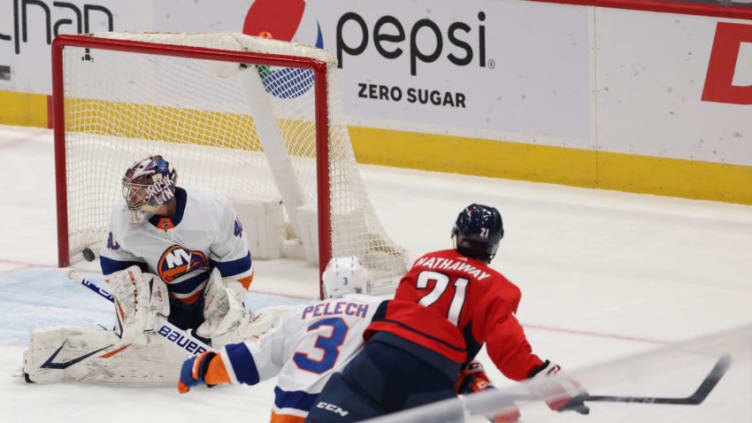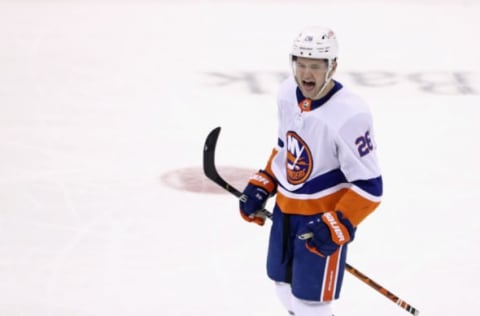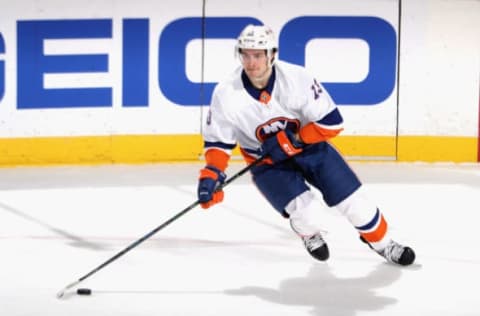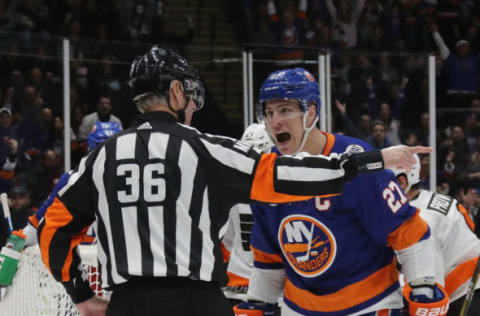Islanders: Three Takeaways from Streak-Ending Tuesday Loss at Capitals


The New York Islanders’ nine-game win streak came to a screeching halt in Washington on Tuesday night, as the Capitals struck twice on the power-play to win 3-1.
The New York Islanders‘ nine-game win streak came to a screeching halt in Washington on Tuesday night, as the Capitals struck twice on the power-play to win 3-1.
Here are three takeaways from the loss.
1. Islanders Power-Play Struggled Again
Outside of Oliver Wahlstrom doing Oliver Wahlstrom things and burying a power-play goal from the inner slot, the New York Islanders power-play was pedestrian at best on Tuesday. That is, unfortunately, not necessarily a new thing either.
The Islanders’ power-play went 0-for-13 in their three game set with the New Jersey Devils this past week, an absolutely horrendous number despite actually getting some pretty good scoring chances throughout the trio of games.
The Islanders had 13 total High-Danger Chances For during the three-game set against New Jersey. Again: they didn’t score on any of them.
Even more impressive, somehow, New Jersey’s penalty kill, which entered the series ranked 31st in the NHL, is still 31st after those three games. That’s how bad the Devils’ penalty kill is, and the Islanders didn’t manage a goal in 13 chances.
But getting back to Tuesday, the Islanders power-play was plagued by all the same old issues. Too much perimeter play with the the power-play unit just standing around, struggling to win face-offs, and then struggling to regain the offensive zone blue line after.
But even when the Islanders top power-play unit had the puck in the O zone, things just looked stagnant for them. They moved the puck without urgency, and were again trying to force play to the top-left side of the umbrella for Ryan Pulock to lean into a shot.
I mean, I get the desire to make that play work. Pulock’s shot is exceptionally heavy, and if he could become an elite power-play force by using it that would make this unit more dangerous. But it hasn’t worked yet, and there isn’t much of an indication that it’s going to start working anytime soon.
It is baffling to me, because I was sure Pulock’s heavy shot would make him a lethal NHL power-play threat way back when the Islanders drafted him, but that has never materialized really. Pulock still hasn’t scored a goal in 2020-21, and while that hasn’t kept him from being one of the top-three defensemen in the NHL this season (that’s right, I said it, and I’m not taking it back) it has hurt the Islanders top power-play unit to not be able to have that weapon.
Earlier this season I did an analysis of the Islanders’ power-play when they were trying out some different formations on the man advantage. I’m paraphrasing here, but essentially they let Mat Barzal roam the ice freely looking to open new passing and shooting lanes where he saw fit, rather than having him stuck to a fixed position, as they do now.
I liked the look of the unit on that night. Their style was fluid, they moved the puck well, and most importantly they even got a shot on goal from Pulock which resulted in a game-winning goal off the stick of Anders Lee. Why they do less of that and more of this, I’m not sure, but Jim Hiller should probably work on that.

2. Barzal Gets Another Lesson in Accountability
Look, we all love Barry Trotz here. He deserves to be in the running for the Jack Adams Trophy every season because of the turnaround this team has had under his coaching. But at what point can we question Trotz’s willingness to sit Mat Barzal? And at what point can we note his seeming unwillingness to show anyone else the same level of discipline?
Mat Barzal took a boneheaded offensive zone retaliation penalty after Evgeni Kuznetsov literally broke his own stick in half by cross-checking Barzal across the back. Presumably to teach Mathew some accountability, Barry benched his 1C following the penalty.
Look, I get it, Barzal currently leads the Islanders in minor penalties against this season. That’s not a good thing. Mat is the Islanders’ best player, and they need him available for every shift. By taking minor penalties he hamstrings his team. Not only by forcing them to kill a penalty, but also by having to play without him for two minutes.
Again though, when do we question why Trotz is so willing to sit his star, but not a player like Leo Komarov?
Reminder, Leo Komarov saw the ice 23 seconds after taking a 5-minute major.
— Eyes on Isles (@eyesonislesFS) March 17, 2021
Love the coach, but that's some wonky accountability.#Isles
Back in January, Leo took a five-minute major for a hit that injured the Capitals’ Lars Eller. In a tie game. In the third period. It wasn’t even like a borderline play, either. Leo’s hit was pretty much undeniably dirty, and definitely unnecessary. Some might even say boneheaded.
Anywho, 23 seconds after his penalty had been killed, Leo was back on the ice for his next shift. He would end up losing his defensive zone coverage, and the Capitals would score the game-winning goal because of it. Barry Trotz said that night in his post-game presser that he did not regret the decision to deploy Leo late in the game.
Maybe I just don’t understand where the line is that Mat is crossing. Yeah, he’s taken a lot of penalties. He’s also drawn as many penalties, if not more than he’s taken, and he’d draw more if NHL officiating wasn’t the joke that it is.
He’s also your best forward and most-important player who you’re benching in the third period of a game you’re trailing 3-1, to a team who you’re battling for first place in your division. Maybe I’m wrong here, but I think the disciplining and the accountability lesson could’ve waited until after the game.

3. The Nature of Officiating in the NHL
Tuesday’s Islanders-Capitals games was one of the most-inconsistently officiated games I can recall in a while, and I’m probably way off on that, because poorly officiated NHL games are more commonplace than well officiated ones.
Look, the nature of refereeing such a fast sport with so many moving parts is that there’s going to be some stuff that gets missed. Stuff is gonna go wrong sometimes, that’s the reality of having on-ice officials refereeing hockey. But something’s gotta give at some point.
On Tuesday, the referees missed Evgeni Kuznetsov literally snap his stick in two by cross-checking Mat Barzal across the back. They then called a minor penalty on Barzal for cross-checking Kuznetsov only moments later. Yes, the retaliation by Barzal was stupid, and it’s something that’s always going to be called by NHL officials.
How about when Richard Panik and Scott Mayfield went at it in front of the benches after the second period had concluded? Why is it that Panik can rip the helmet off of Mayfield’s head, but Mayfield throws a punch and that’s it, he’s off to the box for two minutes.
Panik gets nothing. In fact he gets more than nothing. His team gets a power-play with the Islanders best penalty-killer off the ice, and they score on it! Wow!
I might sound like a salty Islander fan, and that’s because I am. But seriously, NHL officiating stinks. From its execution down to its philosophy, NHL officiating is some of the worst in the big-four North American pro sports.
I mean, we’re not talking about run-of-the-mill referee incompetence either, because that isn’t what this is often times. That isn’t the root of the problem most nights. The problem comes from, in my opinion, the NHL’s, and more broadly, hockey’s philosophical stance on officiating.
Referees should not alter the course of a game, and they should do everything in their power to call a game evenly, even if it means making a call on total non-penalties at any other point in a game.
But by attempting to do that, all the NHL’s referees are doing is actually inserting themselves into the action even more than if they just called the game by the book. Instead, they opt to “let the players play”, and then they call a penalty on team A. But, oh wait, now we’ve called a penalty on team A, now team B needs to get a penalty too, so it’s fair.
Does anyone else notice how ridiculous of a way this is to officiate a professional sport? People bet real money on this stupid league, and that’s how it wants to govern its play.
Officiating the games this way doesn’t insure the outcome isn’t decided by referees, in fact, I’d argue it does quite the opposite. By being wholly unpredictable and inconsistent with your ruleset, and by adjusting the parameters by the second for what constitutes a penalty, you don’t make the game fairer, or freer of referee’s influence.
Look at American football. If the Jets take 5 penalties and lose 60+ yards of field positioning because of it, the NFL’s (also notoriously poor) referees and officiating philosophy do not dictate that the Patriots must then be penalized similarly, regardless of any actual on-field infractions. That becomes part of the narrative: The Patriots were more disciplined than the Jets, and it played a factor in the game’s outcome.
That isn’t how it works in the NHL. In this league, referees routinely move the goal posts on what a penalty is and isn’t, just to facilitate that “fairness” that we’ve talked about. It’s stupid. Call the game by the rulebook, and if that means there are teams penalized more frequently because they can’t play the game by the rules, so be it.
Or, don’t call any penalties at all. Let teams get away with anything and throw the rules aside completely. But whatever it is, make it consistent. Don’t change the rules, or the way they’re enforced, by the minute to facilitate fair play.